专题9 谓语动词的时态和语态课件 (共40张PPT)2025年中考英语语法专题复习
文档属性
| 名称 | 专题9 谓语动词的时态和语态课件 (共40张PPT)2025年中考英语语法专题复习 |

|
|
| 格式 | pptx | ||
| 文件大小 | 2.4MB | ||
| 资源类型 | 教案 | ||
| 版本资源 | 人教新目标(Go for it)版 | ||
| 科目 | 英语 | ||
| 更新时间 | 2024-12-03 00:00:00 | ||
图片预览

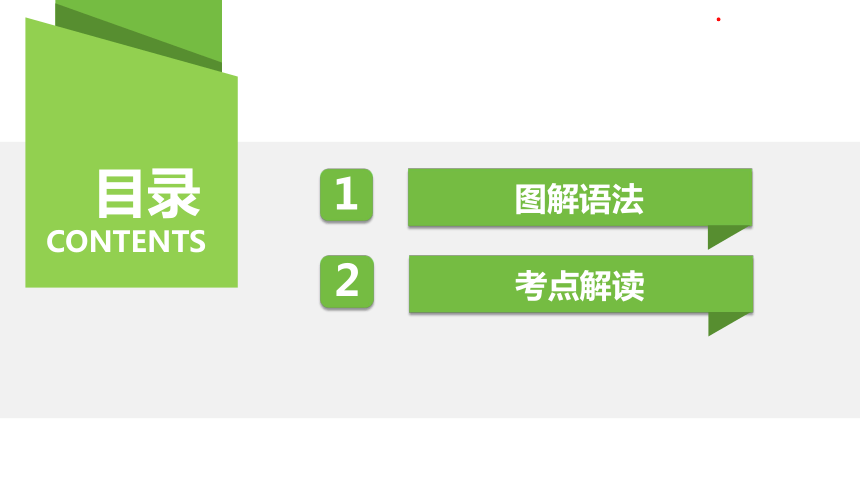

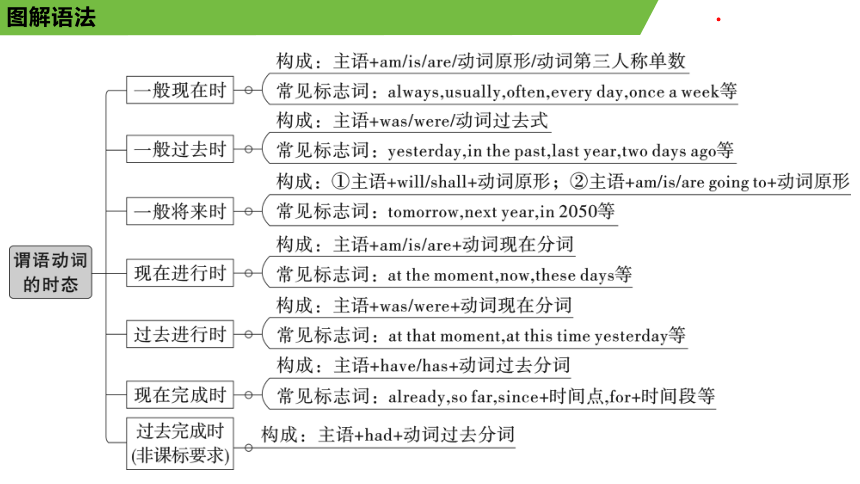
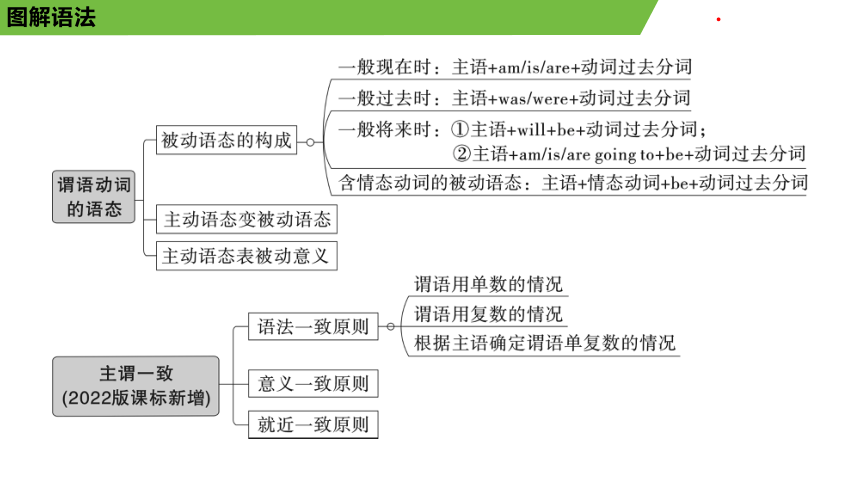

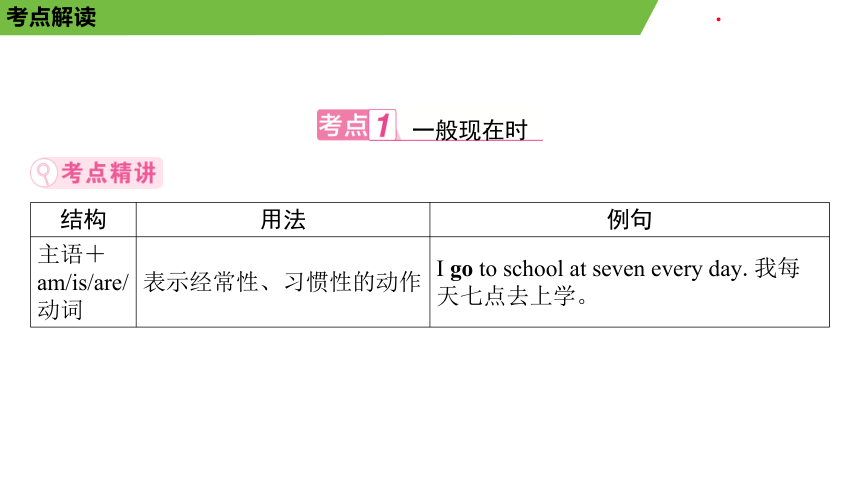

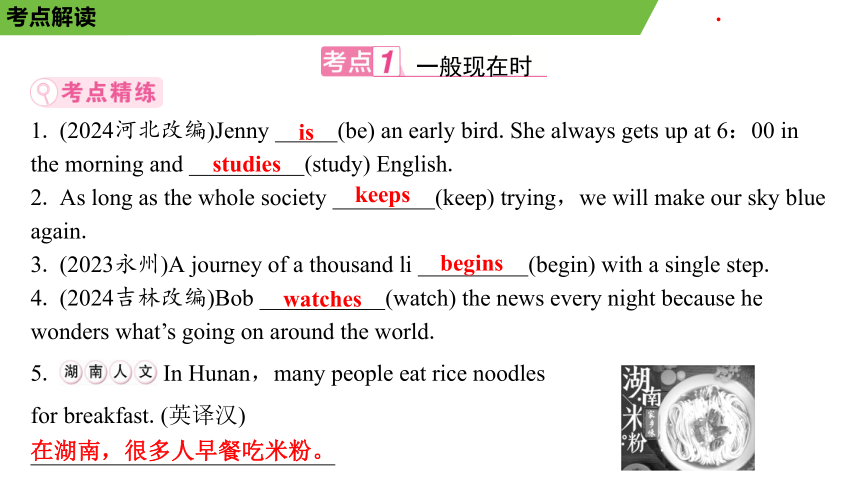
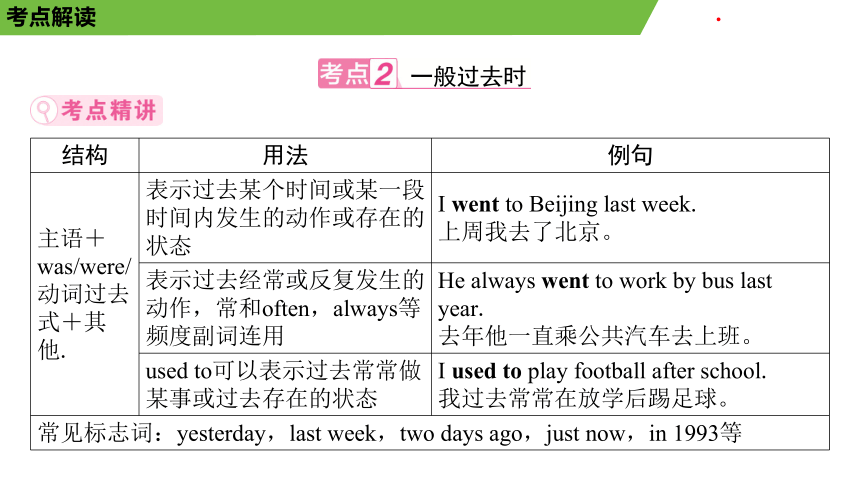
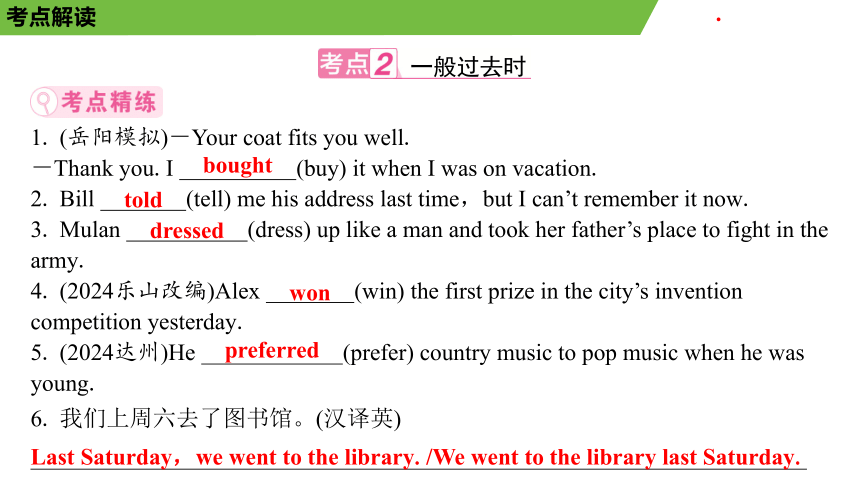
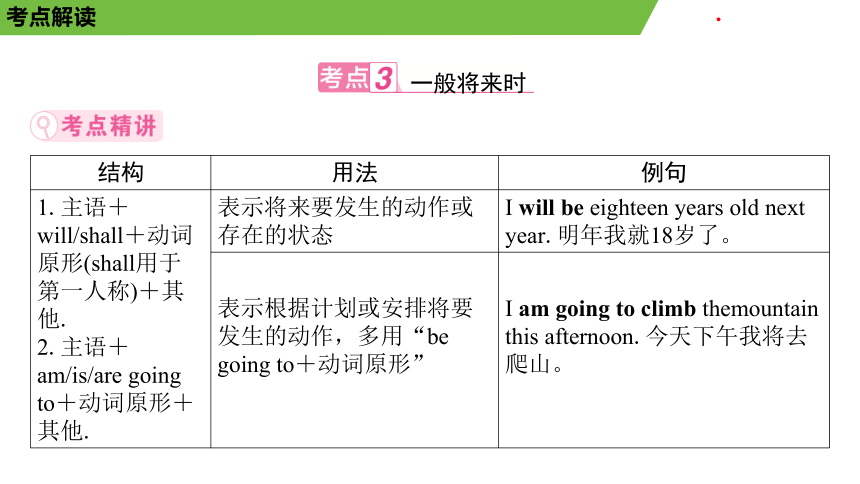
文档简介
(共40张PPT)
专题九 谓语动词的时态和语态
目录
CONTENTS
图解语法
1
考点解读
2
图解语法
01
专题九
考点解读
02
专题九
结构 用法 例句
主语+
am/is/are/
动词 表示经常性、习惯性的动作 I go to school at seven every day.我每
天七点去上学。
一般现在时
结构 用法 例句
原形/动
词第三
人称单
数+其
他. 表示客观事实和真理 The earth goes around the sun.地球绕着
太阳转。
表示性格、特征、能力或存
在的状态 Linda speaks English very well.琳达英
语说得很好。
在时间状语从句和条件状语
从句中代替一般将来时 I’ll go shopping with my mother if she is
free tomorrow.如果明天我妈妈有空,
我将和她去购物。
常见标志词:always,often,usually,sometimes,every day等 一般现在时
1. (2024河北改编)Jenny (be) an early bird.She always gets up at 6:00 in
the morning and (study) English.
2. As long as the whole society (keep) trying,we will make our sky blue
again.
3. (2023永州)A journey of a thousand li (begin) with a single step.
4. (2024吉林改编)Bob (watch) the news every night because he
wonders what’s going on around the world.
is
studies
keeps
begins
watches
一般现在时
5. In Hunan,many people eat rice noodles
for breakfast.(英译汉)
在湖南,很多人早餐吃米粉。
一般过去时
结构 用法 例句
主语+
was/were/
动词过去
式+其
他. 表示过去某个时间或某一段
时间内发生的动作或存在的
状态 I went to Beijing last week.
上周我去了北京。
表示过去经常或反复发生的
动作,常和often,always等
频度副词连用 He always went to work by bus last
year.
去年他一直乘公共汽车去上班。
used to可以表示过去常常做
某事或过去存在的状态 I used to play football after school.
我过去常常在放学后踢足球。
常见标志词:yesterday,last week,two days ago,just now,in 1993等
1. (岳阳模拟)-Your coat fits you well.
-Thank you.I (buy) it when I was on vacation.
2. Bill (tell) me his address last time,but I can’t remember it now.
3. Mulan (dress) up like a man and took her father’s place to fight in the
army.
4. (2024乐山改编)Alex (win) the first prize in the city’s invention
competition yesterday.
5. (2024达州)He (prefer) country music to pop music when he was
young.
bought
told
dressed
won
preferred
一般过去时
6. 我们上周六去了图书馆。(汉译英)
Last Saturday,we went to the library./We went to the library last Saturday.
结构 用法 例句
1.主语+will/shall+动词原形(shall用于第一人称)+其他. 2.主语+am/is/are going to+动词原形+其他. 表示将来要发生的动作或存在的状态 I will be eighteen years old next year.明年我就18岁了。
表示根据计划或安排将要发生的动作,多用“be going to+动词原形” I am going to climb themountain this afternoon.今天下午我将去爬山。
一般将来时
结构 用法 例句
1.主语+will/shall+动词原形(shall用于第一人称)+
其他. 2.主语+am/is/are going to+动词原形+其他. 在时间、条件和让步状语从句中,主句用一般将来时,从句用一般现在时 If it doesn’t rain tomorrow,the sports
meeting will be on schedule.如果明
天不下雨,运动会将如期举行。
常见标志词:tomorrow,next week/month/year,in a few days(in+时间段),in
the future,from now on,soon等 一般将来时
1. Jack,wait a minute.I am (come) soon.
2. -Is Helen here?
-No.She (arrive) in half an hour.
coming
will arrive
一般将来时
3. There (be) a basketball game next Monday.If it rains,
we’ll have to put it off.
4. (2024无锡)Some people believe robots (take) most jobs away from
humans in the future.
5. I am going to Beijing on vacation with my parents this coming summer
holiday.(英译汉)
will be/is going to be
will take
在即将到来的这个暑假,我将和我的父母去北京度假。
结构 用法 例句
主语+am/is /are+动词现
在分词+其他. 表示目前正在进行的动作 Look!She is writing a letter in the room.看!她正在房间里写信。
表示现阶段正在进行,而此刻不一定在进行的动作 We are planting trees these
days.这些天我们在种树。
与always,usually,again,forever等词连用,表示反复发生的动作,常常含有赞扬、不满、厌烦等感彩 You are always talking in class.It’s not polite.你上课老是说话。这很不礼貌。
常见标志词:now,at the moment,look,listen等 现在进行时
1. (2023怀化改编)Look!Our Chinese teacher (give) a talk in the
meeting room.
2. (2024江西改编)-Where is Helen?
-I’m not sure.Maybe she (run) in the sports field.
is giving
is running
现在进行时
3. Students in my class (prepare) for the singing competition at
the moment.
4. (2024无锡)Do you mind turning down the music?I (attend)
an online meeting now.
5. 听!一些老人正在公园里唱歌。(汉译英)
are preparing
am attending
Listen!Some old people are singing in the park.
结构 用法 例句
主语+was/ were+动词现在分词+其他. 表示过去某一时间点或某一时间段正在进行的动作 He was riding his bicycle in the park at
that time.那时他正在公园里骑自行车。
用于when和while引导的时间状语从句中,表示一个动作发生时,另外一个动作正在进行 I was singing when my mother came in.
妈妈进来时,我正在唱歌。
While Tom was doing his homework,
Peter was playing basketball at school.
当汤姆在做作业时,彼得在学校打球。
常见标志词:then,at that time,at ten yesterday等 过去进行时
1. (2023株洲改编)When my friend called me yesterday,I (help)
my mom in the kitchen.
2. (2024武威)Tom and his parents (have) supper when the phone
rang.
3. -What (be) your family doing at 11:30 a.m.yesterday?
-It (rain) at that time.My father (write) an
e-mail in the study.My mother (cook) in the kitchen and I
(sweep) the floor.
was helping
were having
were
was raining
was writing
was cooking
was
sweeping
过去进行时
结构 用法 例句
主语+
have/has
+动词
过去分
词+其
他. 表示过去发生或已经完成的动作对现在造成的影响和结果 I have seen the film already.我已经看过这部电影了。
表示从过去某一时间开始持续到现在,并有可能继续持续下去的动作。常和for或since引导的时间状语或从句连用,这时的谓语动词必须是延续性动词 We have lived in Changsha
since last year.我们从去年
开始就住在长沙了
常见标志词:just,already,yet,recently,before,ever,never,twice,so
far,in the past three years等 现在完成时
★have/has been to,have/has gone to与have/has been in辨析见本册P54考点1
【知识拓展】
在完成时中,非延续性动词不能与表示一段时间的状语连用,此时需要将
非延续性动词替换为延续性动词。如:
(1)I have had the book for two days.这本书我已经买了两天了。(用had而不用
bought)
(2)I have been in Tokyo for two weeks.我已经来东京两周了。(用be in而不用
come to)
常见的非延续性动词变延续性动词:
现在完成时
非延续性
动词 延续性动词 非延续
性动词 延续性动词
borrow/lend keep die be dead
leave be away join be in
begin/start be on buy have
arrive be in open be open
get married be married finish/end be over
1. I (learn) English ever since I was in Grade 3.
have learned
现在完成时
2. So far,red tourism(旅游业) (develop) quickly and it’s
becoming more and more popular.
3. -I haven’t seen Li Ming for days.
-He (go) to Beijing.He will come back next month.
has developed
has gone
4. -Would you like to see the movie The Wandering Earth this evening?
-Oh,it’s a good movie.But I (see) it already.
5. 在过去的几年里长沙发生了很大的变化。(汉译英)
have seen
Great changes have taken place in Changsha in the last/past few years.
结构 用法 例句
主语+had+动词过去分词+其他. 表示过去某一时刻以前已经完成的动作或存在的状态,也就是动作发生在“过去的过去”,通常有过去的某一时间做参照 When the policeman arrived,the thief had run away.当警察到达时,小偷已经逃跑了。
表示从过去某一时刻开始一直延续到另一过去时刻的动作或状态 When Jack arrived,he learned Mary had been away for an hour.当杰克到达时,他得知玛丽已经离开一个小时了。
常见标志词:by the/that time,by the end of+过去的时间点,when,before等 过去完成时(非课标要求)
【知识拓展】
现在完成时与过去完成时的区别:
现在完成时指的是过去的动作或者状态持续到现在,且已经完成了。过去
完成时通常用于描述一直到过去的某个时间点之前完成的动作,强调“过去的
过去”。
如:There have been many changes in my hometown in recent years.近几年我的家
乡发生了许多变化。
At that time she had been out of work for a year.当时她已经失业一年了。
过去完成时(非课标要求)
1. By the time Jim was twelve,he (learn) how to look after
himself well.
2. You told me you (deal) with these books.Why are they still here?
3. By the time I arrived at the bus stop,the bus had already gone.(英译汉)
had learned
had dealt
当我到达公交车站时,公共汽车已经开走了。
过去完成时(非课标要求)
英语中有两种语态:主动语态和被动语态。主动语态表示主语为动作的执
行者;被动语态表示主语为动作的承受者。
如:We all respect him.我们所有人都尊敬他。(主动)
He is respected by us all.他受我们所有人尊敬。(被动)
谓语动词的语态
一、被动语态的构成
时态 结构 例句
一般现在时 am/is/are+动词过去分词 The song often by
boys.这首歌经常被男孩子们唱。
一般过去时 was/were+动词过去分词 Tina to finish homework before dinner yesterday.昨天蒂娜被要求晚饭前完成作业。
一般将来时 will+be+动词过去分词 A big factory in our village next year.我们村明年将建一座大工厂。
一般将来时 am/is/are going to+be+动词过去分词 The problem
at the meeting.这个问 题将在会上被讨论。
is
sung
was
asked
will
be
built
谓语动词的语态
is
going
to
be discussed
时态 结构 例句
现在完成时 (了解) have/has been+动词过
去分词 More and more
trees
on the hill recently.近来,越来越多的
树已经种到小山上了。
含情态动词 的被动语态 情态动词+be+动词过
去分词 Lots of stars
in the sky at night.晚上在天空中能看到
很多星星。
have
been
planted
can
be
seen
一、被动语态的构成
谓语动词的语态
二、主动语态变被动语态
【巧学妙记】
宾变主,主变宾,谓语动词变被动。
谓语动词的语态
【知识拓展】
带有复合宾语的感官动词(短语)feel,see,hear,watch,notice,listen to
等,使役动词let,make,have及动词help在变成被动语态时,应还原不定式符
号to。即:主动语态to省略,被动语态to还原。
如:I saw him cross the street.我看见他过了马路。(主动)
He was seen to cross the street.有人看到他过了马路。(被动)
谓语动词的语态
三、主动语态表被动意义
1. look,sound,taste,smell,feel等感官动词用主动语态表示被动意义。
如:Mooncakes taste very delicious.月饼尝起来很美味。
2. 不及物动词(短语)take place,happen,come out,arrive,appear,rise等没有
被动语态。
如:An accident happened yesterday.昨天发生了一起事故。
3. need和require表示“需要”时,后面常跟动词-ing形式表示被动意义,相当
于to be done。
如:Your clothes need washing/to be washed.你的衣服需要洗了。
谓语动词的语态
4. 表示主语的特征、状态的动词,特别是其后有well,easily等副词修饰时,常
用主动语态表示被动意义。
如:The new dress sells well here.这种新裙子在这里卖得很好。
1. The Spring Festival (celebrate) widely in the world nowadays.
2. (2023怀化改编)The cake (eat) quickly by the hungry students
yesterday.
3. Five more clubs (set) up next week to make our school life rich
and colorful.
4. The problem needed (pay) special attention to.
5. This fish soup (smell) quite great.Can you show me how to make it?
6. Linda didn’t know French,but she was made (sing) a French song
two days later.
is celebrated
was eaten
will be set
paying/to be paid
smells
to sing
谓语动词的语态
主谓一致是指谓语动词与主语在人称和数上保持一致。主谓一致应遵循的
原则可归纳为:语法一致原则、意义一致原则和就近一致原则。
主谓一致(2022版课标新增)
一、语法一致原则(谓语动词在单复数形式上要和主语保持一致)
主语 谓
语 例句
可数名词单数、不可数名词或单个人名、地名等 单
数 Jim travels to China every year.吉姆每年都到中国旅游。
动词不定式短语、动名词短语或从句 Making a difference means making a good change.有所作为意味着做出好的改变。
“one of+可数名词复数”“the number of+可数名词复数” One of my favorite sports basketball.我最喜欢的运动之一是篮球。
The number of teachers in our school is 125.我们学校老师的人数为125。
somebody,anything,everybody, no one,either,neither,each,
the other,another等不定代词作主语 Something is wrong with my watch.我的手表出了问题。
主谓一致(2022版课标新增)
is
“a number of+可数名词复数” 复
数 A number of famous people were invited to the
party.许多名人都被邀请参加这个聚会。
both…and…连接两个名
词作主语 Both his father and his mother teachers.
他的爸爸和妈妈都是老师。
a lot of/lots of/plenty of/most of+名词 取
决 于 主
语 Plenty of water has been polluted.大量的水已经被污染了。
A lot of people taking action to protect
the environment.许多人正在采取行动保护环境。
名词或代词后跟with,together with,like,except,but,as well as等 My mother as well as my sister goes to the
supermarket.我妈妈和我妹妹一起去超市。
are
are
一、语法一致原则(谓语动词在单复数形式上要和主语保持一致)
主谓一致(2022版课标新增)
二、意义一致原则(概念一致,即谓语动词的形式要和主语所表达的概念一致)
主语 谓
语 例句
and连接两个可数名词单数作
主语,表示同一个人或物时
(and后面无冠词) 单
数 A famous writer and teacher is going to have
a speech in our school.一位著名的作家兼教
师将在我们学校举行演讲。
表示时间、距离、金钱、重
量、长度等名词作主语 Three hours not enough to finish the
work.
三个小时完成这项工作是不够的。
is
主谓一致(2022版课标新增)
主语 谓
语 例句
the+姓氏名词复数,表“…… 一家”或“……夫妇” 复
数 The Smiths having dinner now.史密斯一家现在正在吃晚饭。
the+某些形容词,表示一类人 The old feel the cold more than the young.老年人比年轻人怕冷。
are
二、意义一致原则(概念一致,即谓语动词的形式要和主语所表达的概念一致)
主谓一致(2022版课标新增)
主语 谓语 例句
family,class,group等集合名词作主语时,如果作为一个整体看待,谓语动词用单数;如果侧重其中的成员,谓语动词用复数 取决 于主
语 Our family is in Changde.我们家在常德。
Our family all playing
soccer.我们家所有人都喜欢踢足球。
单复数同形的名词,如sheep,fish,deer,Chinese等 取决 于主
语 There are many deer in this forest.这个森林里有许多鹿。
A deer was very thirsty and hurried to the
river.一只小鹿很渴,匆忙跑去了河边。
like/enjoy
主谓一致(2022版课标新增)
二、意义一致原则(概念一致,即谓语动词的形式要和主语所表达的概念一致)
三、就近一致原则(指谓语动词的形式不与主语的单复数一致,而和离它最近
的名词或代词的单复数一致)
1. either…or…,neither…nor…,not only…but(also)…,not…but…或or连接两
个并列成分作主语时,谓语动词和距离其最近的主语在数上保持一致。
如:Either Jimmy or I am going to give a speech.
2. 在there be和here be句型中,be动词与离它最近的主语在数上保持一致。
如:Here is a book and two pencils for you.
There is a pear and some apples in my bag.
主谓一致(2022版课标新增)
1. Neither Saturday nor Sunday (be) OK because I will be quite busy these
two days.
2. In our school library,there a number of books on art.The number of
the books growing larger and larger.(be)
3. Mandy as well as the other girl students (have) learned how to play the
violin.
4. Using public chopsticks (be) necessary when eatingwith others.
5. People around the world wear different traditional clothes.(英译汉)
is
are
is
has
is
世界各地的人们穿不同的传统服饰。
6. 架子上有两个瓶子和一个碗。(汉译英)
There are two bottles and a bowl on the shelf.
主谓一致(2022版课标新增)
专题九 谓语动词的时态和语态
目录
CONTENTS
图解语法
1
考点解读
2
图解语法
01
专题九
考点解读
02
专题九
结构 用法 例句
主语+
am/is/are/
动词 表示经常性、习惯性的动作 I go to school at seven every day.我每
天七点去上学。
一般现在时
结构 用法 例句
原形/动
词第三
人称单
数+其
他. 表示客观事实和真理 The earth goes around the sun.地球绕着
太阳转。
表示性格、特征、能力或存
在的状态 Linda speaks English very well.琳达英
语说得很好。
在时间状语从句和条件状语
从句中代替一般将来时 I’ll go shopping with my mother if she is
free tomorrow.如果明天我妈妈有空,
我将和她去购物。
常见标志词:always,often,usually,sometimes,every day等 一般现在时
1. (2024河北改编)Jenny (be) an early bird.She always gets up at 6:00 in
the morning and (study) English.
2. As long as the whole society (keep) trying,we will make our sky blue
again.
3. (2023永州)A journey of a thousand li (begin) with a single step.
4. (2024吉林改编)Bob (watch) the news every night because he
wonders what’s going on around the world.
is
studies
keeps
begins
watches
一般现在时
5. In Hunan,many people eat rice noodles
for breakfast.(英译汉)
在湖南,很多人早餐吃米粉。
一般过去时
结构 用法 例句
主语+
was/were/
动词过去
式+其
他. 表示过去某个时间或某一段
时间内发生的动作或存在的
状态 I went to Beijing last week.
上周我去了北京。
表示过去经常或反复发生的
动作,常和often,always等
频度副词连用 He always went to work by bus last
year.
去年他一直乘公共汽车去上班。
used to可以表示过去常常做
某事或过去存在的状态 I used to play football after school.
我过去常常在放学后踢足球。
常见标志词:yesterday,last week,two days ago,just now,in 1993等
1. (岳阳模拟)-Your coat fits you well.
-Thank you.I (buy) it when I was on vacation.
2. Bill (tell) me his address last time,but I can’t remember it now.
3. Mulan (dress) up like a man and took her father’s place to fight in the
army.
4. (2024乐山改编)Alex (win) the first prize in the city’s invention
competition yesterday.
5. (2024达州)He (prefer) country music to pop music when he was
young.
bought
told
dressed
won
preferred
一般过去时
6. 我们上周六去了图书馆。(汉译英)
Last Saturday,we went to the library./We went to the library last Saturday.
结构 用法 例句
1.主语+will/shall+动词原形(shall用于第一人称)+其他. 2.主语+am/is/are going to+动词原形+其他. 表示将来要发生的动作或存在的状态 I will be eighteen years old next year.明年我就18岁了。
表示根据计划或安排将要发生的动作,多用“be going to+动词原形” I am going to climb themountain this afternoon.今天下午我将去爬山。
一般将来时
结构 用法 例句
1.主语+will/shall+动词原形(shall用于第一人称)+
其他. 2.主语+am/is/are going to+动词原形+其他. 在时间、条件和让步状语从句中,主句用一般将来时,从句用一般现在时 If it doesn’t rain tomorrow,the sports
meeting will be on schedule.如果明
天不下雨,运动会将如期举行。
常见标志词:tomorrow,next week/month/year,in a few days(in+时间段),in
the future,from now on,soon等 一般将来时
1. Jack,wait a minute.I am (come) soon.
2. -Is Helen here?
-No.She (arrive) in half an hour.
coming
will arrive
一般将来时
3. There (be) a basketball game next Monday.If it rains,
we’ll have to put it off.
4. (2024无锡)Some people believe robots (take) most jobs away from
humans in the future.
5. I am going to Beijing on vacation with my parents this coming summer
holiday.(英译汉)
will be/is going to be
will take
在即将到来的这个暑假,我将和我的父母去北京度假。
结构 用法 例句
主语+am/is /are+动词现
在分词+其他. 表示目前正在进行的动作 Look!She is writing a letter in the room.看!她正在房间里写信。
表示现阶段正在进行,而此刻不一定在进行的动作 We are planting trees these
days.这些天我们在种树。
与always,usually,again,forever等词连用,表示反复发生的动作,常常含有赞扬、不满、厌烦等感彩 You are always talking in class.It’s not polite.你上课老是说话。这很不礼貌。
常见标志词:now,at the moment,look,listen等 现在进行时
1. (2023怀化改编)Look!Our Chinese teacher (give) a talk in the
meeting room.
2. (2024江西改编)-Where is Helen?
-I’m not sure.Maybe she (run) in the sports field.
is giving
is running
现在进行时
3. Students in my class (prepare) for the singing competition at
the moment.
4. (2024无锡)Do you mind turning down the music?I (attend)
an online meeting now.
5. 听!一些老人正在公园里唱歌。(汉译英)
are preparing
am attending
Listen!Some old people are singing in the park.
结构 用法 例句
主语+was/ were+动词现在分词+其他. 表示过去某一时间点或某一时间段正在进行的动作 He was riding his bicycle in the park at
that time.那时他正在公园里骑自行车。
用于when和while引导的时间状语从句中,表示一个动作发生时,另外一个动作正在进行 I was singing when my mother came in.
妈妈进来时,我正在唱歌。
While Tom was doing his homework,
Peter was playing basketball at school.
当汤姆在做作业时,彼得在学校打球。
常见标志词:then,at that time,at ten yesterday等 过去进行时
1. (2023株洲改编)When my friend called me yesterday,I (help)
my mom in the kitchen.
2. (2024武威)Tom and his parents (have) supper when the phone
rang.
3. -What (be) your family doing at 11:30 a.m.yesterday?
-It (rain) at that time.My father (write) an
e-mail in the study.My mother (cook) in the kitchen and I
(sweep) the floor.
was helping
were having
were
was raining
was writing
was cooking
was
sweeping
过去进行时
结构 用法 例句
主语+
have/has
+动词
过去分
词+其
他. 表示过去发生或已经完成的动作对现在造成的影响和结果 I have seen the film already.我已经看过这部电影了。
表示从过去某一时间开始持续到现在,并有可能继续持续下去的动作。常和for或since引导的时间状语或从句连用,这时的谓语动词必须是延续性动词 We have lived in Changsha
since last year.我们从去年
开始就住在长沙了
常见标志词:just,already,yet,recently,before,ever,never,twice,so
far,in the past three years等 现在完成时
★have/has been to,have/has gone to与have/has been in辨析见本册P54考点1
【知识拓展】
在完成时中,非延续性动词不能与表示一段时间的状语连用,此时需要将
非延续性动词替换为延续性动词。如:
(1)I have had the book for two days.这本书我已经买了两天了。(用had而不用
bought)
(2)I have been in Tokyo for two weeks.我已经来东京两周了。(用be in而不用
come to)
常见的非延续性动词变延续性动词:
现在完成时
非延续性
动词 延续性动词 非延续
性动词 延续性动词
borrow/lend keep die be dead
leave be away join be in
begin/start be on buy have
arrive be in open be open
get married be married finish/end be over
1. I (learn) English ever since I was in Grade 3.
have learned
现在完成时
2. So far,red tourism(旅游业) (develop) quickly and it’s
becoming more and more popular.
3. -I haven’t seen Li Ming for days.
-He (go) to Beijing.He will come back next month.
has developed
has gone
4. -Would you like to see the movie The Wandering Earth this evening?
-Oh,it’s a good movie.But I (see) it already.
5. 在过去的几年里长沙发生了很大的变化。(汉译英)
have seen
Great changes have taken place in Changsha in the last/past few years.
结构 用法 例句
主语+had+动词过去分词+其他. 表示过去某一时刻以前已经完成的动作或存在的状态,也就是动作发生在“过去的过去”,通常有过去的某一时间做参照 When the policeman arrived,the thief had run away.当警察到达时,小偷已经逃跑了。
表示从过去某一时刻开始一直延续到另一过去时刻的动作或状态 When Jack arrived,he learned Mary had been away for an hour.当杰克到达时,他得知玛丽已经离开一个小时了。
常见标志词:by the/that time,by the end of+过去的时间点,when,before等 过去完成时(非课标要求)
【知识拓展】
现在完成时与过去完成时的区别:
现在完成时指的是过去的动作或者状态持续到现在,且已经完成了。过去
完成时通常用于描述一直到过去的某个时间点之前完成的动作,强调“过去的
过去”。
如:There have been many changes in my hometown in recent years.近几年我的家
乡发生了许多变化。
At that time she had been out of work for a year.当时她已经失业一年了。
过去完成时(非课标要求)
1. By the time Jim was twelve,he (learn) how to look after
himself well.
2. You told me you (deal) with these books.Why are they still here?
3. By the time I arrived at the bus stop,the bus had already gone.(英译汉)
had learned
had dealt
当我到达公交车站时,公共汽车已经开走了。
过去完成时(非课标要求)
英语中有两种语态:主动语态和被动语态。主动语态表示主语为动作的执
行者;被动语态表示主语为动作的承受者。
如:We all respect him.我们所有人都尊敬他。(主动)
He is respected by us all.他受我们所有人尊敬。(被动)
谓语动词的语态
一、被动语态的构成
时态 结构 例句
一般现在时 am/is/are+动词过去分词 The song often by
boys.这首歌经常被男孩子们唱。
一般过去时 was/were+动词过去分词 Tina to finish homework before dinner yesterday.昨天蒂娜被要求晚饭前完成作业。
一般将来时 will+be+动词过去分词 A big factory in our village next year.我们村明年将建一座大工厂。
一般将来时 am/is/are going to+be+动词过去分词 The problem
at the meeting.这个问 题将在会上被讨论。
is
sung
was
asked
will
be
built
谓语动词的语态
is
going
to
be discussed
时态 结构 例句
现在完成时 (了解) have/has been+动词过
去分词 More and more
trees
on the hill recently.近来,越来越多的
树已经种到小山上了。
含情态动词 的被动语态 情态动词+be+动词过
去分词 Lots of stars
in the sky at night.晚上在天空中能看到
很多星星。
have
been
planted
can
be
seen
一、被动语态的构成
谓语动词的语态
二、主动语态变被动语态
【巧学妙记】
宾变主,主变宾,谓语动词变被动。
谓语动词的语态
【知识拓展】
带有复合宾语的感官动词(短语)feel,see,hear,watch,notice,listen to
等,使役动词let,make,have及动词help在变成被动语态时,应还原不定式符
号to。即:主动语态to省略,被动语态to还原。
如:I saw him cross the street.我看见他过了马路。(主动)
He was seen to cross the street.有人看到他过了马路。(被动)
谓语动词的语态
三、主动语态表被动意义
1. look,sound,taste,smell,feel等感官动词用主动语态表示被动意义。
如:Mooncakes taste very delicious.月饼尝起来很美味。
2. 不及物动词(短语)take place,happen,come out,arrive,appear,rise等没有
被动语态。
如:An accident happened yesterday.昨天发生了一起事故。
3. need和require表示“需要”时,后面常跟动词-ing形式表示被动意义,相当
于to be done。
如:Your clothes need washing/to be washed.你的衣服需要洗了。
谓语动词的语态
4. 表示主语的特征、状态的动词,特别是其后有well,easily等副词修饰时,常
用主动语态表示被动意义。
如:The new dress sells well here.这种新裙子在这里卖得很好。
1. The Spring Festival (celebrate) widely in the world nowadays.
2. (2023怀化改编)The cake (eat) quickly by the hungry students
yesterday.
3. Five more clubs (set) up next week to make our school life rich
and colorful.
4. The problem needed (pay) special attention to.
5. This fish soup (smell) quite great.Can you show me how to make it?
6. Linda didn’t know French,but she was made (sing) a French song
two days later.
is celebrated
was eaten
will be set
paying/to be paid
smells
to sing
谓语动词的语态
主谓一致是指谓语动词与主语在人称和数上保持一致。主谓一致应遵循的
原则可归纳为:语法一致原则、意义一致原则和就近一致原则。
主谓一致(2022版课标新增)
一、语法一致原则(谓语动词在单复数形式上要和主语保持一致)
主语 谓
语 例句
可数名词单数、不可数名词或单个人名、地名等 单
数 Jim travels to China every year.吉姆每年都到中国旅游。
动词不定式短语、动名词短语或从句 Making a difference means making a good change.有所作为意味着做出好的改变。
“one of+可数名词复数”“the number of+可数名词复数” One of my favorite sports basketball.我最喜欢的运动之一是篮球。
The number of teachers in our school is 125.我们学校老师的人数为125。
somebody,anything,everybody, no one,either,neither,each,
the other,another等不定代词作主语 Something is wrong with my watch.我的手表出了问题。
主谓一致(2022版课标新增)
is
“a number of+可数名词复数” 复
数 A number of famous people were invited to the
party.许多名人都被邀请参加这个聚会。
both…and…连接两个名
词作主语 Both his father and his mother teachers.
他的爸爸和妈妈都是老师。
a lot of/lots of/plenty of/most of+名词 取
决 于 主
语 Plenty of water has been polluted.大量的水已经被污染了。
A lot of people taking action to protect
the environment.许多人正在采取行动保护环境。
名词或代词后跟with,together with,like,except,but,as well as等 My mother as well as my sister goes to the
supermarket.我妈妈和我妹妹一起去超市。
are
are
一、语法一致原则(谓语动词在单复数形式上要和主语保持一致)
主谓一致(2022版课标新增)
二、意义一致原则(概念一致,即谓语动词的形式要和主语所表达的概念一致)
主语 谓
语 例句
and连接两个可数名词单数作
主语,表示同一个人或物时
(and后面无冠词) 单
数 A famous writer and teacher is going to have
a speech in our school.一位著名的作家兼教
师将在我们学校举行演讲。
表示时间、距离、金钱、重
量、长度等名词作主语 Three hours not enough to finish the
work.
三个小时完成这项工作是不够的。
is
主谓一致(2022版课标新增)
主语 谓
语 例句
the+姓氏名词复数,表“…… 一家”或“……夫妇” 复
数 The Smiths having dinner now.史密斯一家现在正在吃晚饭。
the+某些形容词,表示一类人 The old feel the cold more than the young.老年人比年轻人怕冷。
are
二、意义一致原则(概念一致,即谓语动词的形式要和主语所表达的概念一致)
主谓一致(2022版课标新增)
主语 谓语 例句
family,class,group等集合名词作主语时,如果作为一个整体看待,谓语动词用单数;如果侧重其中的成员,谓语动词用复数 取决 于主
语 Our family is in Changde.我们家在常德。
Our family all playing
soccer.我们家所有人都喜欢踢足球。
单复数同形的名词,如sheep,fish,deer,Chinese等 取决 于主
语 There are many deer in this forest.这个森林里有许多鹿。
A deer was very thirsty and hurried to the
river.一只小鹿很渴,匆忙跑去了河边。
like/enjoy
主谓一致(2022版课标新增)
二、意义一致原则(概念一致,即谓语动词的形式要和主语所表达的概念一致)
三、就近一致原则(指谓语动词的形式不与主语的单复数一致,而和离它最近
的名词或代词的单复数一致)
1. either…or…,neither…nor…,not only…but(also)…,not…but…或or连接两
个并列成分作主语时,谓语动词和距离其最近的主语在数上保持一致。
如:Either Jimmy or I am going to give a speech.
2. 在there be和here be句型中,be动词与离它最近的主语在数上保持一致。
如:Here is a book and two pencils for you.
There is a pear and some apples in my bag.
主谓一致(2022版课标新增)
1. Neither Saturday nor Sunday (be) OK because I will be quite busy these
two days.
2. In our school library,there a number of books on art.The number of
the books growing larger and larger.(be)
3. Mandy as well as the other girl students (have) learned how to play the
violin.
4. Using public chopsticks (be) necessary when eatingwith others.
5. People around the world wear different traditional clothes.(英译汉)
is
are
is
has
is
世界各地的人们穿不同的传统服饰。
6. 架子上有两个瓶子和一个碗。(汉译英)
There are two bottles and a bowl on the shelf.
主谓一致(2022版课标新增)
同课章节目录
- 词法
- 名词
- 动词和动词短语
- 动词语态
- 动词时态
- 助动词和情态动词
- 非谓语动词
- 冠词
- 代词
- 数词和量词
- 形容词副词及其比较等级
- 介词和介词短语
- 连词和感叹词
- 构词法
- 相似、相近词比较
- 句法
- 陈述句
- 一般疑问句和否定疑问句
- 特殊疑问句及选择疑问句
- 反意疑问句
- 存在句(There be句型)
- 宾语从句
- 定语从句
- 状语从句
- 主谓一致问题
- 简单句
- 并列句
- 复合句
- 主谓一致
- 主、表语从句
- 名词性从句
- 直接引语和间接引语
- 虚拟语气
- 感叹句
- 强调句
- 倒装句
- 祈使句
- 句子的成分
- 句子的分类
- 题型专区
- 单项选择部分
- 易错题
- 完形填空
- 阅读理解
- 词汇练习
- 听说训练
- 句型转换
- 补全对话
- 短文改错
- 翻译
- 书面表达
- 任务型阅读
- 语法填空
- 其他资料
